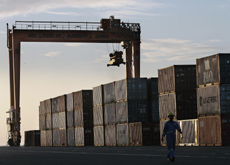
Reuters | 03 March 2010
by Asma Alsharif
Saudi Arabia is considering building a new port in the Red sea city of Jeddah to handle rising imports such as wheat and barley under a food security plan, an official said on Wednesday.
Food security has topped the policy agenda in the Gulf Arab region following rampant inflation in 2008 that underscored the peninsula's dependence on imports and forced countries to invest abroad to ensure supplies of staples like rice and wheat.
Top OPEC oil exporter Saudi Arabia has emerged as global buyer of wheat and is also trying with the help of private Saudi investors to secure farmland in Africa and elsewhere abroad to import more food.
"The new port is still under study and we are looking at various locations for a port to support Jeddah's Islamic port in food security imports," Khalid Bubshait, head of the Saudi Ports Authority, told Reuters in an interview.
Jeddah Islamic Port (JIC) is the largest in the kingdom with a capacity of 3.2 million TEUs (Twenty-Foot Equivalent Units), representing 73 percent of the country's container traffic.
The port is expected to nearly double its capacity to 6 million TEUs by 2011 as it is undergoing expansion of its three terminals.
JIC has faced some congestion in 2008 and 2009, resulting in hefty charges for many delayed ships as well as the diversion of some shipping lines to other ports.
"This new port will deal with non-container imports like wheat and barley imports," Bubshait said, declining to give a cost estimate for the port.
"The idea of this port is still under study and no decision has been taken yet. We haven't decided on the size or number of docks yet," he added.
Since Saudi Arabia abandoned its wheat cultivation programme two years ago, due to dwindling water resources in the desert kingdom, it became a major buyer of wheat from global markets.
Experts expect Saudi Arabia to import 3 million tonnes of wheat per year from 2009 until 2016.
Saudi Arabia has urged companies to invest in farm projects abroad. In April, Riyadh set up a company with capital of 3 billion riyals ($800 million) to invest in farmland abroad, focusing on wheat, rice, sugar and soybeans.
State-owned Saudi Industrial Development Fund is granting financing facilities to firms exploring agricultural investments abroad. Several Saudi firms also launched farmland investment abroad ranging from Indonesia to Ethiopia.











